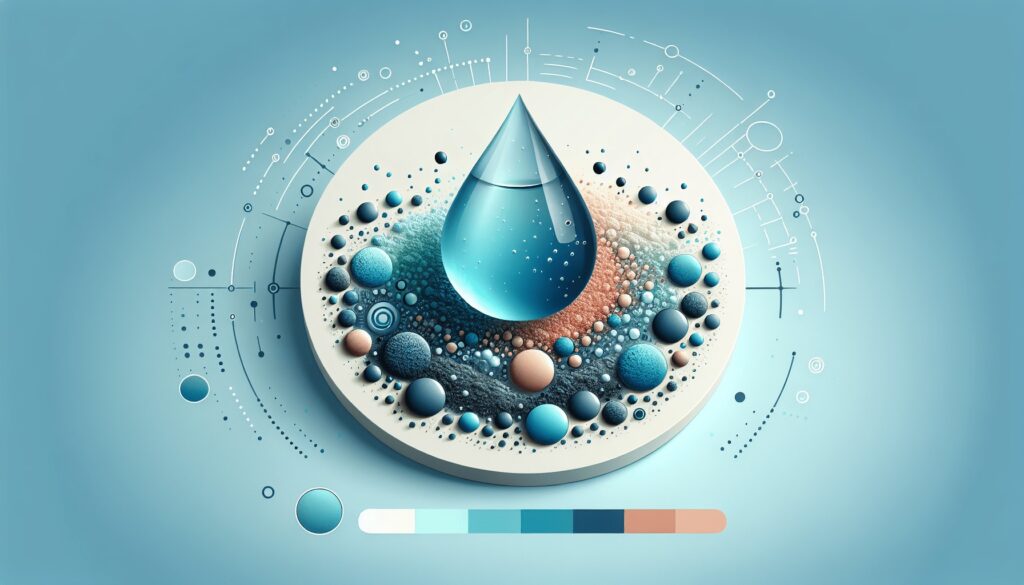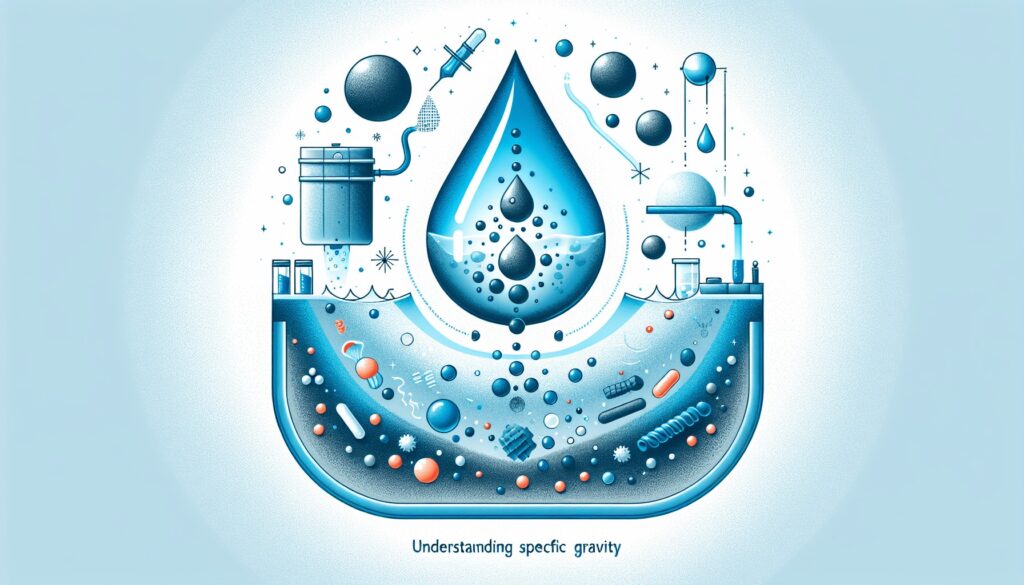Have you ever wondered how wastewater management systems determine the concentration of substances in waste? One crucial measurement used is specific gravity. Understanding specific gravity can significantly impact how wastewater is treated and managed, ensuring that the systems function optimally and sustainably.

What is Specific Gravity?
To get to grips with wastewater management, it’s essential first to understand what specific gravity is. Simply put, specific gravity is a dimensionless number that indicates the ratio of the density of a substance to the density of a reference substance, usually water for liquids. This measure can provide you with valuable insights regarding the characteristics and behavior of the wastewater.
In the context of wastewater, knowing the specific gravity helps in understanding the composition of the waste and how it might interact with the treatment processes. If your work involves managing wastewater, getting familiar with this concept is incredibly beneficial.
Importance of Specific Gravity in Wastewater Management
The significance of specific gravity cannot be overstated when it comes to wastewater management. Specific gravity plays a crucial role in determining the separation of solid components during the treatment process. You’d find it crucial in processes like sedimentation and flotation, which are common in wastewater treatment facilities.
Additionally, knowing the specific gravity helps in the calibration of various equipment and systems used in treating wastewater. For example, it helps separate oil, grease, and other non-soluble substances. When the specific gravity is measured accurately, it can help optimize the treatment process, leading to more efficient and cost-effective operations.
Role in Sedimentation and Flotation
Sedimentation and flotation are key processes in wastewater management where specific gravity is vital. These methods rely on the idea that particles with different specific gravities will separate naturally over time. In sedimentation, particles with higher specific gravity than water settle at the bottom of the treatment tank. Conversely, flotation exploits the principle that lighter particles float, which can be useful for removing oil and grease layers. Your understanding of specific gravity in these scenarios can be the difference between efficient and inefficient treatment.
Equipment Calibration
Another area where specific gravity is essential is in calibrating equipment such as flow meters and pumps within the wastewater facility. Accurate equipment ensures that the right amount of chemicals is used and that processes like aeration and filtration are properly regulated. This precision results in fewer mechanical issues and lower maintenance costs, an advantage that you would definitely appreciate.
Measuring Specific Gravity
Now that you’re aware of its importance, the next step is understanding how specific gravity is measured. Fortunately, this is a straightforward process often conducted with a device called a hydrometer or through more advanced methods like digital density meters.
Using a Hydrometer
A hydrometer is a simple tool that you immerse in the liquid to measure the specific gravity. The device floats in the liquid, and the point to which it sinks indicates the liquid’s density compared to water. This traditional method is reliable and generally sufficient for most preliminary wastewater assessments.
Digital Density Meters
For a more precise measurement, you might want to consider using digital density meters. These are more advanced devices that provide quick and accurate readings. If your operations require high precision, digital meters offer a great alternative to traditional methods.
Table: Comparison Between Hydrometers and Digital Density Meters
| Feature | Hydrometer | Digital Density Meter |
|---|---|---|
| Cost | Low | High |
| Accuracy | Moderate | High |
| Ease of Use | Simple | Requires some training |
| Maintenance | Minimal | Regular calibration required |
| Suitability | Basic measurements | Precise measurements |
Factors Affecting Specific Gravity in Wastewater
Understanding the factors that can affect specific gravity in wastewater is valuable. This knowledge helps you account for variations and adjust the treatment processes effectively.
Temperature
Temperature is a significant factor that affects specific gravity. As temperature increases, water expands, causing a decrease in density and thus a decrease in specific gravity. It’s important to consider the temperature of the wastewater when measuring its specific gravity to ensure accuracy.
Composition of Waste
The types of solids, oils, and other substances present in the wastewater will influence its specific gravity. Heavy metals or dense particles can significantly increase it, whereas substances like oil can lower it. Keeping track of what your wastewater is carrying can help predict changes in specific gravity.
Aeration and Mixing
Aeration and mixing can also affect the specific gravity of wastewater. These processes introduce air into the water, which may reduce density. Regular monitoring ensures you can distinguish between changes due to treatment processes and actual changes in wastewater composition.

Impact of Specific Gravity on Treatment Methods
Once you’ve accurately measured the specific gravity, the challenge becomes how to use this information in selecting and optimizing treatment methods. Let’s delve into some processes where specific gravity plays an essential role.
Biological Treatment
In biological treatment, specific gravity information helps predict how sludge and biomass will behave. This understanding is crucial for maintaining healthy microbial populations and ensuring the effective breakdown of organic matter. You can use this data to adjust aeration and reduce sludge bulking while increasing the efficiency of biological treatment systems.
Chemical Treatment
Chemical treatments, such as adding coagulants and flocculants, often use specific gravity measurements to determine the amount of chemicals needed. By knowing the specific gravity, you can better control these addition rates, ensuring you neither overdose nor underdose the chemicals, which in turn optimizes treatment efficiency and cost.
Physical Treatment
Physical treatments like screening and filtration also rely on the understanding of specific gravity for efficiency. Materials with different specific gravities can be more efficiently filtered or separated when you understand their characteristics.
Challenges in Measuring and Using Specific Gravity
While the theory behind specific gravity is straightforward, practical challenges can arise. Recognizing these challenges helps you implement more effective solutions.
Instrument Calibration
Regular calibration of measuring instruments is essential to ensure accuracy. Instruments can drift over time, leading to errors in readings that could affect your wastewater treatment process. Keeping a strict calibration schedule and having backup instruments can mitigate these issues.
Variability in Wastewater
Wastewater is variable and unpredictable, which can affect specific gravity measurements. Seasonal changes, water usage patterns, and industrial discharges can all cause fluctuations, requiring continuous monitoring and adaptability on your part.
Human Error
Like any other measurement, human error can greatly impact accuracy. Training staff to use instruments properly and implementing checks and balances ensures that errors are minimized and data is reliable.
Advancements in Technology
Innovations in technology have paved the way for more efficient management of wastewater specific gravity. Understanding these advancements can aid your operations.
Automation and Real-Time Monitoring
Automation has made it possible to continuously monitor specific gravity in real-time. This advancement allows for timely interventions and optimizations, enhancing the overall efficiency of wastewater treatment. Automated systems can detect changes immediately, providing you with critical data faster than traditional methods could.
Smart Sensors
Smart sensors have taken specific gravity measurement to another level. They integrate seamlessly into existing wastewater systems to provide accurate, real-time readings. These sensors can adapt to a variety of wastewater types, allowing you to streamline your operations without needing extensive changes.
Conclusion
Specific gravity in wastewater management is a vital component that supports a multitude of treatment processes. From understanding its fundamental nature to navigating measurement challenges and exploring technological advancements, your grasp of this concept is essential. Detailing the significance, measuring techniques, impacting factors, and advancements helps ensure that your wastewater systems operate optimally, paving the way for sustainable and effective wastewater management. Remember, staying informed and adaptable is key to mastering the art of wastewater treatment through specific gravity.